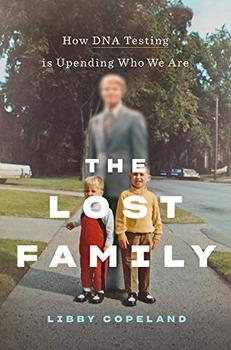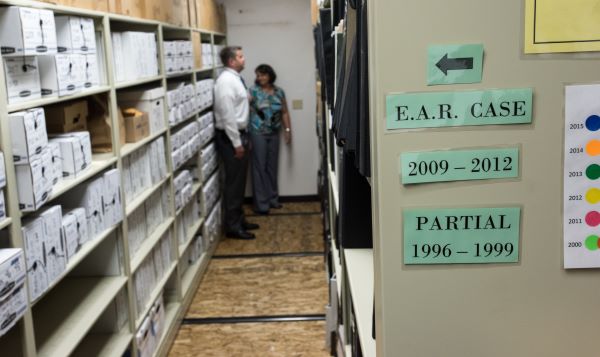Summary | Excerpt | Reviews | Beyond the Book | Read-Alikes | Genres & Themes | Author Bio

Critics' Opinion:
Readers' Opinion:
First Published:
Mar 2020, 304 pages
Paperback:
Mar 2021, 304 pages
 Book Reviewed by:
Book Reviewed by:
Elisabeth Herschbach
Buy This Book
This article relates to The Lost Family
 In The Lost Family, Libby Copeland examines some of the complex issues surrounding commercial DNA testing, including concerns about privacy and consent. To what extent should we be comfortable entrusting our DNA to powerful corporations that can take our most intimate information—our genetic data—and put it to uses we aren't even aware of and often can't control?
In The Lost Family, Libby Copeland examines some of the complex issues surrounding commercial DNA testing, including concerns about privacy and consent. To what extent should we be comfortable entrusting our DNA to powerful corporations that can take our most intimate information—our genetic data—and put it to uses we aren't even aware of and often can't control?
From the advent of consumer DNA testing, privacy experts have warned that the seemingly simple act of sending in a saliva sample or a cheek swab for genetic analysis can set off a chain of unintended consequences. A powerful reminder of such unforeseen applications came in April 2018, when authorities announced the arrest of Joseph James DeAngelo, alleged to be the Golden State Killer (also known as the East Area Rapist and the Original Night Stalker), the perpetrator of a string of violent crimes committed in the 1970s and 1980s.
Law enforcement officers were able to tie DeAngelo to the decades-old crimes—including at least 12 murders, 50 rapes and dozens of burglaries throughout California—by using a popular genealogy website that hosts a free database of users' DNA. Using the same method that recreational genealogists use to fill in missing branches of their family trees, investigators uploaded a DNA sample from a crime scene and identified distant relatives of the suspect. They were then able to trace these relatives directly to DeAngelo, even though he himself had never taken a DNA test.
Since the Golden State Killer case, information from genealogy databases has been used to identify suspects in more than 50 additional cases. And while some hail the technique as a powerful law enforcement tool, many critics raise concerns about the ethics of using shared genetic data to find suspects who never opted to have their DNA tested, let alone consented to a police search.
Without explicit laws or policies governing how and when genealogy databases can be used in criminal cases, critics worry that there is little oversight to ensure that the science is done correctly and the results properly interpreted—or to prevent law enforcement agencies from sliding down a slippery slope and applying forensic genealogy in the case of more and more minor crimes.
These concerns become particularly acute as the popularity of genetic testing grows. A 2018 study estimated that from the genetic data of 1.28 million people—roughly the size of the database used to crack the Golden State Killer case—it is possible to find a third cousin or closer for some 60 percent of Americans of European descent, the primary consumers of DNA tests. As DNA databases get larger and larger, the US will effectively have what amounts to a de facto national DNA database, University of Maryland law professor Natalie Ram warns.
Special Agent Marcus Knutson and Deputy Paige Kneeland searching for evidence related to the case of the Golden State Killer, or East Area Rapist (Source: FBI)
Filed under Medicine, Science and Tech
![]() This "beyond the book article" relates to The Lost Family. It originally ran in May 2020 and has been updated for the
March 2021 paperback edition.
Go to magazine.
This "beyond the book article" relates to The Lost Family. It originally ran in May 2020 and has been updated for the
March 2021 paperback edition.
Go to magazine.





The Flower Sisters
by Michelle Collins Anderson
From the new Fannie Flagg of the Ozarks, a richly-woven story of family, forgiveness, and reinvention.

The House on Biscayne Bay
by Chanel Cleeton
As death stalks a gothic mansion in Miami, the lives of two women intertwine as the past and present collide.

The Funeral Cryer by Wenyan Lu
Debut novelist Wenyan Lu brings us this witty yet profound story about one woman's midlife reawakening in contemporary rural China.
Your guide toexceptional books
BookBrowse seeks out and recommends the best in contemporary fiction and nonfiction—books that not only engage and entertain but also deepen our understanding of ourselves and the world around us.